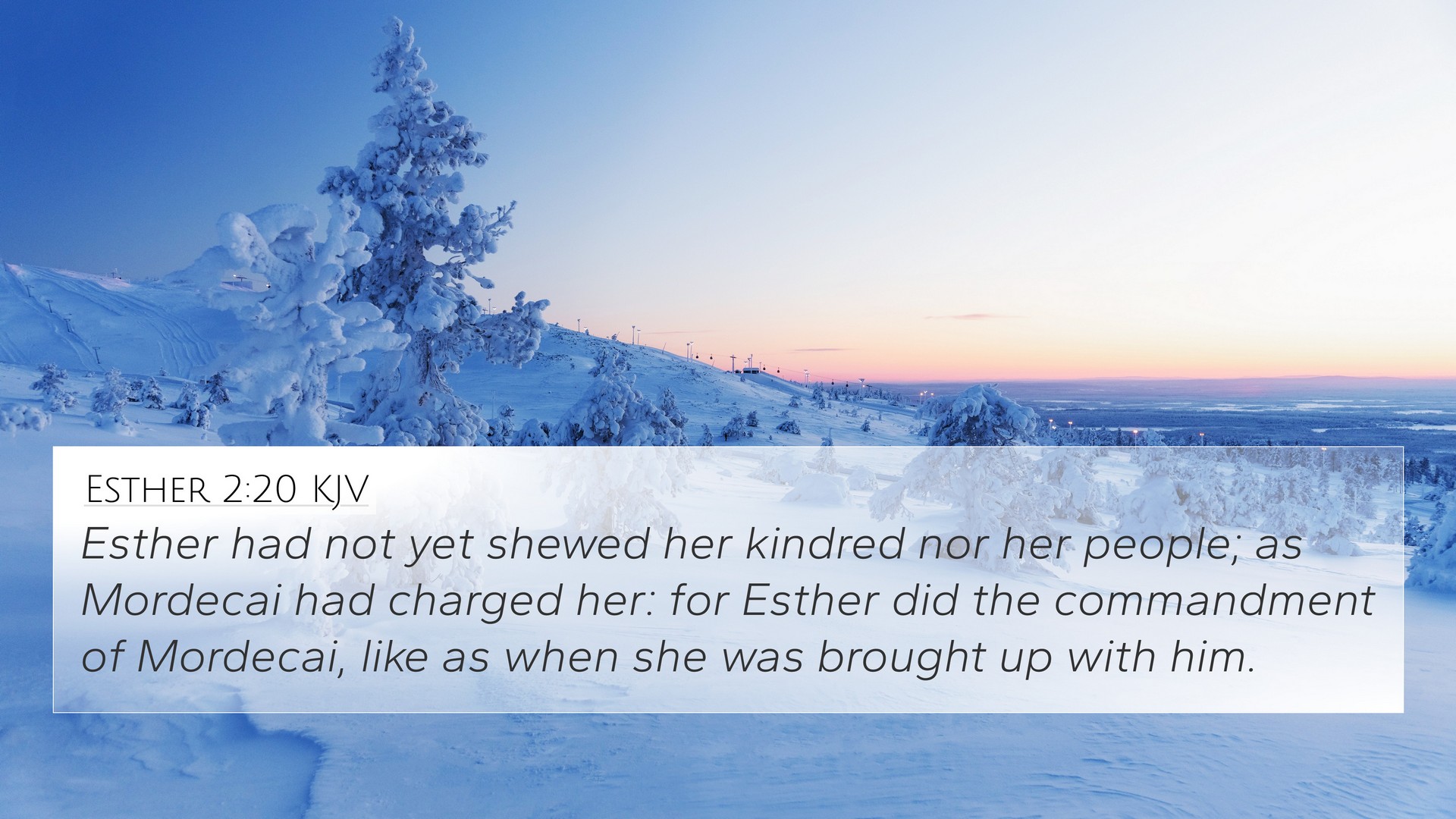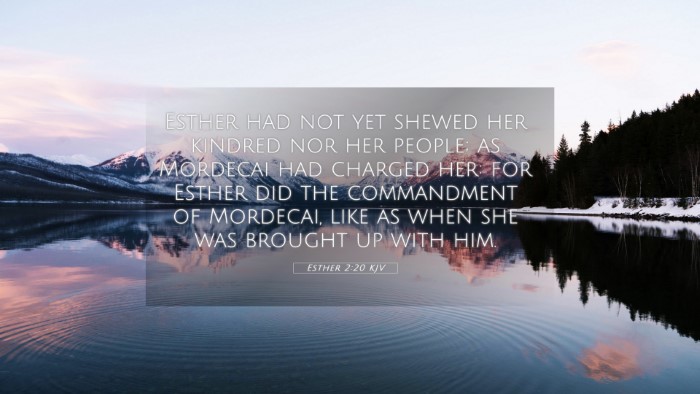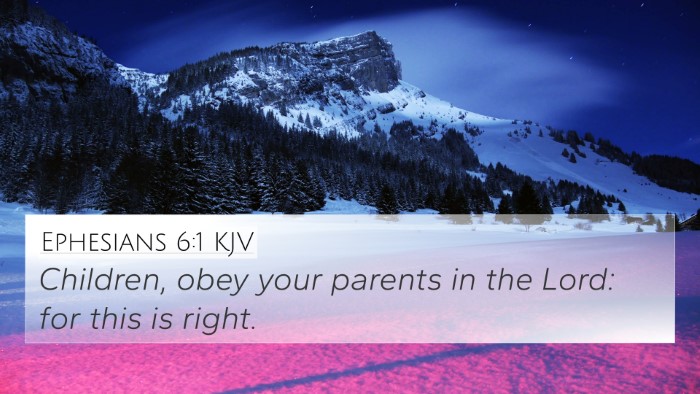Old Testament
Genesis Exodus Leviticus Numbers Deuteronomy Joshua Judges Ruth 1 Samuel 2 Samuel 1 Kings 2 Kings 1 Chronicles 2 Chronicles Ezra Nehemiah Esther Job Psalms Proverbs Ecclesiastes Song of Solomon Isaiah Jeremiah Lamentations Ezekiel Daniel Hosea Joel Amos Obadiah Jonah Micah Nahum Habakkuk Zephaniah Haggai Zechariah MalachiEsther 2:20 Similar Verses
Esther 2:20 Cross References
Esther had not yet shewed her kindred nor her people; as Mordecai had charged her: for Esther did the commandment of Mordecai, like as when she was brought up with him.
Uncover the Rich Themes and Topics of This Bible Verse
Listed below are the Bible themes associated with Esther 2:20. We invite you to explore each theme to gain deeper insights into the Scriptures.
Esther 2:20 Cross Reference Verses
This section features a detailed cross-reference designed to enrich your understanding of the Scriptures. Below, you will find carefully selected verses that echo the themes and teachings related to Esther 2:20 KJV. Click on any image to explore detailed analyses of related Bible verses and uncover deeper theological insights.
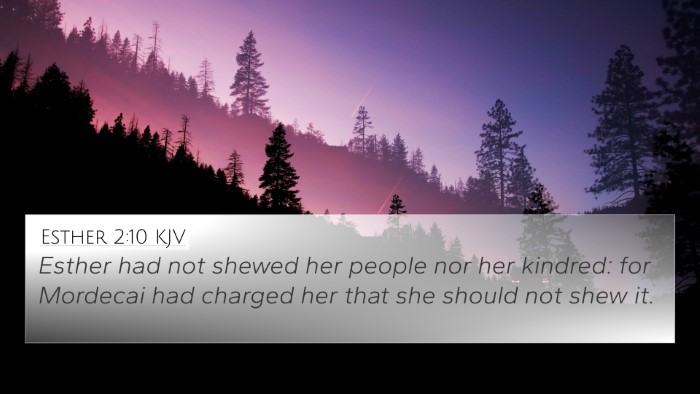
Esther 2:10 (KJV) »
Esther had not shewed her people nor her kindred: for Mordecai had charged her that she should not shew it.
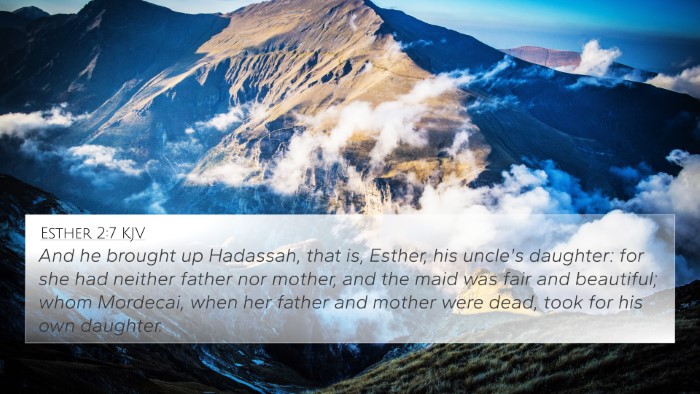
Esther 2:7 (KJV) »
And he brought up Hadassah, that is, Esther, his uncle's daughter: for she had neither father nor mother, and the maid was fair and beautiful; whom Mordecai, when her father and mother were dead, took for his own daughter.
Esther 2:20 Verse Analysis and Similar Verses
Understanding Esther 2:20
Esther 2:20 states: "Esther had not made known her kindred nor her people; as Mordecai had charged her: for Esther did the commandment of Mordecai, like as when she was brought up with him."
Summary of Esther 2:20
This verse emphasizes the obedience of Esther to her guardian, Mordecai, and her discretion regarding her Jewish identity during a time of potential danger. It highlights the importance of following counsel, especially when it comes to matters of identity and safety.
Commentary Insights
-
Matthew Henry:
Henry points out Esther's faithful adherence to Mordecai’s guidance, illustrating her humility and respect. He emphasizes that her act of concealing her identity reflects wisdom and a strategic approach to her circumstances as a Jewish woman in a foreign court.
-
Albert Barnes:
Barnes notes that Esther's obedience to Mordecai indicates that she recognized the importance of his elder wisdom. This highlights a theme throughout the book of Esther—aligning one’s actions with the counsel of those with greater experience and insight.
-
Adam Clarke:
Clarke elaborates on the significance of identity in this narrative, suggesting that Esther's hidden lineage signifies God's providential care over His people, even in their trials. Clarke emphasizes the broader themes of God's oversight and protection in the lives of His people.
Thematic Connections
This verse serves as a foundational element within the larger narrative of Esther, linking her personal story to themes of Jewish identity, obedience, and divine providence. The narrative presents numerous opportunities for cross-referencing other Biblical scriptures that resonate with these themes.
Related Bible Cross References
- Deuteronomy 7:6 - God’s chosen people and identity
- Proverbs 1:8 - Importance of heeding parental instruction
- Jeremiah 29:11 - Assurance of God’s plans for His people
- Esther 4:14 - Mordecai’s call for Esther’s intervention
- Philippians 2:5 - Encouragement for having the mind of Christ and obedience
- Romans 8:28 - God's providence in the lives of believers
- 2 Timothy 2:15 - Importance of rightly dividing the word of truth
Tools for Cross-Referencing and Deeper Study
For further exploration of connections between Bible verses and comprehensive cross-reference guides, one may utilize:
- Bible Concordance
- Bible Cross-Reference Guide
- Cross-Reference Bible Study Tools
- Comprehensive Bible Cross-Reference Materials
How to Use Bible Cross-References
Cross-referencing allows for a richer understanding of Biblical themes. Readers can:
- Identify connections between Old and New Testament verses.
- Explore detailed comparisons between Gospels.
- Link teachings from the Prophets to Apostolic writings.
- Interpret overarching themes through cross-referencing.
Conclusion
Esther 2:20 is not only a testament to Esther’s character but also serves as a significant link to the overarching narrative of God’s providence in the lives of His people. By exploring the connections between Bible verses, especially through cross-referenced themes, readers gain a deeper understanding of God’s plan and the intricate relationships woven throughout Scripture.
